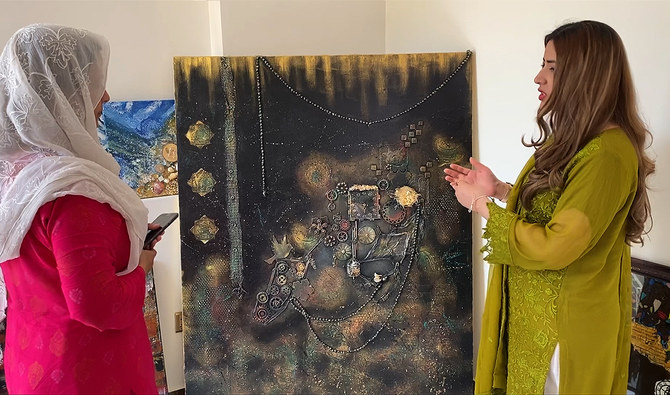KARACHI: Shaira Ariz, a Pakistani artist who lived in Saudi Arabia for twelve years and showcased her work at prestigious art galleries in Riyadh, has said she started her artistic journey after being inspired by reforms in the kingdom brought about by the Saudi crown prince, which motivated her to make “women’s empowerment” a central theme of her work.
The self-taught artist was born in Karachi and lived in the kingdom for more than a decade before recently resettling in Pakistan.
In an interview to Arab News this week, Ariz said she started her career as an artist by making “creative boxes” that she sold at marketplaces across Riyadh, but after Saudi Crown Prince Mohammed bin Salman’s socio-economic reforms brought about a sea change in the country, she honed her skills in sketching and drawing and eventually turned toward tackling complex subjects as an abstract artist.
In 2016, the Saudi crown prince unveiled ambitious plans, called Vision 2030, aimed at ending the kingdom’s reliance on oil and transforming it into a global investment power. The plan also includes more rights for women and a larger place for them in economic and political life, as well as the promotion of cultural and sports events and entertainment facilities, and Saudi Arabia’s ancient heritage and national identity. Under the reforms, in June 2018, Saudi Arabia also lifted a long-term ban on women driving motor vehicles.
“Women’s empowerment is the central theme of my paintings,” Ariz, who has exhibited her artwork at Saudi Arabia’s Naila Art Gallery among others, said. “I saw the crown prince taking many steps for women and work was done to make them move forward so I thought I should also do something.”
“I did sketching, drawing and then I started acrylic polling,” the artist said, referring to different techniques she subsequently learnt. “Then I moved toward realism, [and] then started abstract work and did mixed-media art.”
Ariz also set up what she called an exhibition hall in her own home to display her work for friends and other artists, especially Arabs.
“The Arabs were my good friends, I would invite them [and] they would all show up to see my artwork,” she said.
Ariz said she chose women’s empowerment as a central theme of her paintings to inspire other women.
“Today’s woman is very talented,” she said. “I want to [display] their talent so I create messages for them.”
Pointing at one painting, Ariz said:
“I have [painted] a window and there is a woman standing against a wall. So, in this I wanted to tell that there’s a woman who is pushed against the wall and she has dreams to progress and she wants to move forward. At certain points, the woman gets tired but even then, she constantly strives to move forward, and she creates her own path for herself.”
This is also what the artist said she wanted to show in one of her best works, a mixed-media creation which is made with historical coins of different countries, rope and a gold medal to “showcase harmony and unity” as well as strength.
“These historical coins of different countries are a symbol of unanimity and unity, while the rope and gold medal show strength,” Ariz said.
In another painting, she used coins to dispel the impression that money earned by expatriates was “easy money.”
“I have tried to show in this painting that people see the money of those living in foreign countries but they don’t see their hard work. So, I have tried to show that a person earns after so much hard work,” she said.
Now, living once again in Karachi, Ariz said she cherished her memories of living in the kingdom.
What she remembered most, she said, was how much people in Saudi Arabia supported each other and the love and acceptance she received as an artist.
“All artists support each other there,” she said, remembering her first visit to the Naila Art Gallery. “They treated me the way as if they had known me for a long time.”

























